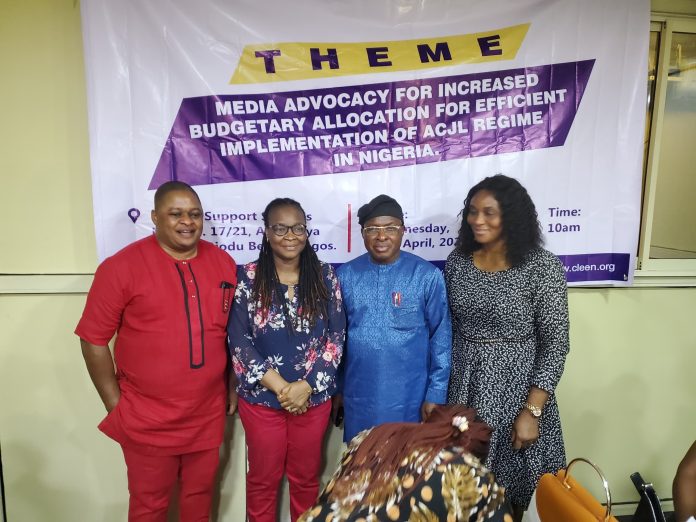CLEEN Foundation has raised concerns over the inadequate budgetary allocation for the implementation of the Administration of Criminal Justice Law (ACJL), urging states to take intentional steps towards ensuring effective justice processes. The non-profit organization made this call during a media dialogue in Lagos, emphasizing the urgent need for increased funding to support the ACJL.
A recent study conducted by the foundation across eight states—Bauchi, Jigawa, Delta, Cross River, Edo, Kwara, Sokoto, and Katsina—revealed minimal efforts in addressing the challenges hindering the effective implementation of the criminal justice law. Despite 35 states collectively allocating over N245 billion to local security outfits, weapons, and uniforms in this year’s budget, no significant effort was made to ensure the functionality of the criminal justice system. CLEEN Foundation described this as a critical deficit, suggesting that the apparent neglect of justice sector funding could be a strategy to maintain political influence over the judiciary.
Acting Executive Director of CLEEN Foundation, Peter Maduoma, highlighted the essential role of the media in driving reforms, urging journalists to continue spotlighting the issues hampering the implementation of the ACJL. He noted that one of the major challenges facing the law is that many officials are expected to enforce it without proper knowledge or familiarity with its provisions. Maduoma stressed that inadequate funding for criminal justice reforms often stems from a preference for capital projects, which offer visible political mileage, over initiatives that genuinely foster social change.
He pointed out that the tendency of government officials to invest heavily in infrastructure while neglecting judicial reforms has led to societal issues, including instances of mob justice, such as the recent unrest in Uromi, Edo State. Furthermore, he criticized the practice of plea bargaining within the criminal justice system, describing it as a process that has been compromised by corruption, extortion, and miscarriage of justice.
During the event, Maduoma commended the media for their role in disseminating information on criminal justice reforms, particularly under the McArthur Foundation project. He noted that as the project nears its conclusion, sustained media engagement would be crucial in pushing the initiative forward for an effective and functional criminal justice system in Nigeria.
CLEEN Foundation’s Programme Director, Dr. Salaudeen Hashim, further underscored the importance of adequate funding for ACJL implementation. He stated that proper financial support would accelerate judicial processes, reduce case backlogs, and prevent undue delays caused by intermediate appeals. He raised concerns over why state governments remain reluctant to adequately fund ACJL implementation, despite its critical role in ensuring justice.
Hashim emphasized that at the national level, the 2024 budget allocated only N73 million for ACJL implementation, a figure he described as grossly inadequate compared to the significant sums dedicated to office renovations. He pointed out that the trend of prioritizing capital projects with potential financial benefits over systemic reforms requires urgent media scrutiny.
Further findings from the CLEEN Foundation revealed that many states have failed to establish Administrative Criminal Justice Monitoring Committees, which are responsible for ensuring compliance among criminal justice actors. Even in states where these committees exist, they are either non-functional or lack the necessary framework to operate effectively. Hashim warned that these gaps in implementation have led to justice becoming a commodity for sale, severely undermining the independence of the judiciary.
The lack of adequate infrastructure for justice delivery was also highlighted, with Hashim noting that despite ACJL provisions for modernized interrogation rooms, only Katsina State has met this requirement at its police headquarters. This underscores the widespread neglect of crucial legal frameworks meant to enhance judicial efficiency.
Head of Lagos Office, CLEEN Foundation, Blessing Abiri, wrapped up the session by stressing that laws often remain ineffective due to the failure of budgetary allocations to support their implementation. She reiterated that addressing these financial gaps is essential for achieving a robust and functional criminal justice system in Nigeria.















